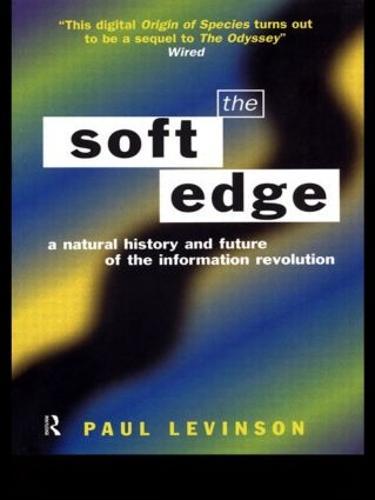Full Product Details
Author: Paul Levinson
Publisher: Taylor & Francis Ltd
Imprint: Routledge
Dimensions:
Width: 15.60cm
, Height: 1.40cm
, Length: 23.40cm
Weight: 0.385kg
ISBN: 9780415197724
ISBN 10: 0415197724
Pages: 276
Publication Date: 03 September 1998
Audience:
College/higher education
,
Professional and scholarly
,
Undergraduate
,
Postgraduate, Research & Scholarly
Format: Paperback
Publisher's Status: Active
Availability: In Print

This item will be ordered in for you from one of our suppliers. Upon receipt, we will promptly dispatch it out to you. For in store availability, please contact us.
Reviews
This history provides a refreshing contrast to texts that are little more than litanies of dates and/or tomes of doomsayers. It provides excellent insights and is suggested reading for those with a keen interest in media. <br>- Educator <br> The Soft Edge is a wonderful book, both as a historical survey of how information technologies have evolved and as a critique of how some media critics have portrayed computers and the Internet. <br>- Technology and Society <br> Remarkable in both scholarly sweep and rhetorical lyricism. . . what first promises to be the digital Origin of the Species turns out to be a sequel to The Odyssey: media's progress is presented as an epic journey toward freedom, unseating censors along the way. <br>- Wired <br> Smart, spare, yet deep, and heartily recommended. <br>- Library Journal <br>... defies the critics of technology who insist that technology robs human life of its human character...well worth the attention of those interested in the history, nature, and future of technology. <br>- Analog <br>
This history provides a refreshing contrast to texts that are little more than litanies of dates and/or tomes of doomsayers. It provides excellent insights and is suggested reading for those with a keen interest in media. - Educator The Soft Edge is a wonderful book, both as a historical survey of how information technologies have evolved and as a critique of how some media critics have portrayed computers and the Internet. - Technology and Society Remarkable in both scholarly sweep and rhetorical lyricism. . . what first promises to be the digital Origin of the Species turns out to be a sequel to The Odyssey: media's progress is presented as an epic journey toward freedom, unseating censors along the way. - Wired Smart, spare, yet deep, and heartily recommended. - Library Journal ... defies the critics of technology who insist that technology robs human life of its human character...well worth the attention of those interested in the history, nature, and future of technology. - Analog
The soft edge of the title refers to the intangibles surrounding technology's impact on society. The second half of this overview of the development of information techonology gets mired down in elaborating on this definition, to the study's detriment. The natural history offered by Levinson, an educator and writer (New School for Social Research) takes the study of information from the dawn of written language to word processing, showing, for instance, how radio, which would presumably be replaced by television, survived by finding its niche with rock 'n' roll - something TV could never offer on the same scale. The implications that Levinson derives from the first part of his study, stressing the ways in which new media have always had a profound impact on human society, are often thought-provoking though sometimes unconvincing. For instance, Levinson ties the success of monotheism to the Israelites, who had an alphabet, as opposed to earlier monotheistic Egyptians, who had hieroglyphics and, thus, lower literacy rates. However, the assertion that the ancient Egyptians ever were monotheistic is only a theory, and is not substantial enough to build yet other theories on, which Levinson repeatedly attempts to do. Further pitfalls await the author as he attempts to attack the World Wide Web and artificial intelligence. His arguments increasingly ignore the larger impact of new information technology on contemporary society altogether, instead addressing such seemingly unrelated topics as copyright law, author compensation, and online education. Levinson's sprawling investigation and proliferating theories lessen the strength of his clever final chapter, which uses instant coffee as an ingenious metaphor for information - you can describe it, he says, and it is an efficient way to transport a product, but if you can't taste it, what good is it? Levinson should have excised the chapters that don't tie in with his central theme. As it stands, The Soft Edge is too soft, and without taste. (Kirkus Reviews)



